34 use case diagram extend
Những Use Case có extend không ghi chú cụ thể điều kiện khi nào thì UC extend xảy ra. Một note nhỏ quan trọng cho anh em, Use Case Diagram sạch đẹp là chỉ nên có trên dưới 10 Use Case trong đó. Các Use Case còn lại anh em hãy dùng Boundary of System để phân chia theo phân hệ một cách hợp ...
Use case diagram menggambarkan sebuah interaksi antara satu atau lebih aktor dengan sistem yang akan dibuat. Secara sederhana, diagram use case digunakan untuk memahami fungsi apa saja yang ada di dalam sebuah sistem dan siapa saja yang dapat menggunakan fungsi-fungsi tersebut. Menurut Rosa dan Salahudin use case digram tidak menjelaskan secara ...
USE CASE - DIFFERENCE BETWEEN INCLUDE AND EXTEND NOTATION August 28, 2019 I see people always struggling with include/exclude notation inside use case diagrams. I think these diagrams could explain it better. Now, lets look at the extended diagram. Notice how connections have changed.

Use case diagram extend
Kalau Extend, misalkan customer mau lihat barang, maka ketika customer mau melihat barang tidak perlu melewati proses login dan pesan barang.; Kalau Include, misalkan admin mau isi data barang, maka ketika admin mau isi data barang harus melewati proses login terlebih dahulu misal dengan mengisi username dan password.; Kesimpulan. Extend yaitu dimana use case yang dituju berdiri sendiri tanpa ...
pull the Alternative Flow and its sub-flows out into a new Use Case. The «extend» relationship says that we execute the base Use Case but when we get to a specified point in the flow, if the right conditions are met, we perform some different steps. Clearly this is very similar to an Alternative Flow. The advantage is that the Alternative
case diagram? Extend is used when a use case conditionally adds steps to another first class use case. For example, imagine "Withdraw Cash" is a use case of an ATM machine. "Assess Fee" would extend Withdraw Cash and describe the conditional "extension point" that is
Use case diagram extend.
Thing to remember is that the base use-case should be able to perform a function on its own even if the extending usecase is not called. Extend relationship is shown as a dashed line with an open arrowhead directed from the extending use-case to the extended (base) use-case. The arrow is labeled with the keyword «extend». Include
รูปที่ 7 แสดง Use Case Diagram ที่มีความสัมพันธ์แบบ Extend Relationship จากรูปที่ 7 สังเกตที่ Use Case "Register Course" ซึ่งเป็น Base Use Case คือ ทาหน้าที่รับลงทะเบียนตามปกติ แต่เมื่อมี ...
When to use "Extend" Use case diagram templates of common scenarios Importance of Use Case Diagrams As mentioned before use case diagrams are used to gather a usage requirement of a system. Depending on your requirement you can use that data in different ways. Below are few ways to use them.
Use case diagrams can show information that makes it easier to program You can show specific relationships between the actions (or classes and methods) with include and extend. When one action is dependent on another action, use an include relationship. For example when you Add a comment in the habit tracker app, you must Update the habit history.
Learn how to make Use Case Diagrams in this tutorial. Both beginners and intermediate UML diagrammers will find all the necessary training and examples on sy...
Extend is intended to be used when there is some additional behavior that should be added, possibly conditionally, to the behavior defined in one or more UseCases. The extended UseCase is defined independently of the extending UseCase and is meaningful independently of the extending UseCase.
Use Case Descriptions • actors - something with a behavior or role, e.g., a person, another system, organization. • scenario - a specific sequence of actions and interactions between actors and the system, a.k.a. a use case instance • use case - a collection of related success and failure scenarios, describing actors using the system to
A use case diagram is used to represent the dynamic behavior of a system. It encapsulates the system's functionality by incorporating use cases, actors, and their relationships. It models the tasks, services, and functions required by a system/subsystem of an application.
Use Case Diagram Examples. The figure below shows an ATM use case diagram example, which is quite a classic example to use in teaching use case diagram. The Document Management System (DMS) use case diagram example below shows the actors and use cases of the system. In particular, there are include and extend relationships among use cases.
In our previous content, we have discussed the use case diagram which represents the working of the system. A use case diagram has a set of 'use cases' and 'actors'. A use case represents a bit of systems functionality and actors are the objects which interact with the system to get the work done from the system for which it is designed.
Answer (1 of 4): Use cases share different kinds of relationships. Defining the relationship between two use cases is the decision of the software analysts of the use case diagram. A relationship between two use cases is basically modeling the dependency between the two use cases. The reuse of an...
Many modelers avoid the use of extend dependencies as this technique has a tendency to make use-case diagrams difficult to understand. My preference is to use extend dependencies sparingly. Note, the extending use case¾in this case "Perform Security Check"would list "UC33 Enroll in University," the base use case, in its "Extends" list.
In a UML use case diagram, extend relationships can be created between two use cases to model optional behavior that is defined in the extended use case. Extensions only operate under certain conditions. The same extending use case can extend more than one use case, and an extending use case may itself be extended.
A UML use case diagram is the primary form of system/software requirements for a new software program underdeveloped. Use cases specify the expected behavior (what), and not the exact method of making it happen (how). Use cases once specified can be denoted both textual and visual representation (i.e. use case diagram).
UML Use Case Include. Use case include is a directed relationship between two use cases which is used to show that behavior of the included use case (the addition) is inserted into the behavior of the including (the base) use case.. The include relationship could be used: . to simplify large use case by splitting it into several use cases, to extract common parts of the behaviors of two or ...
Just out of the head it seems to be clear: "extend" is some kind of specialization, a use case that extends the functionalities of its base case etc...while "include" is a use-case which will be called as a consequence of invoking another one.
UML Use Case Extend Extend is a directed relationship that specifies how and when the behavior defined in usually supplementary (optional) extending use case can be inserted into the behavior defined in the extended use case . Extended use case is meaningful on its own, it is independent of the extending use case.
SysML Use Case Diagram. The purpose of a Use Case Diagram is to give a graphical overview of the functionalities provided by a system in terms of actors, their goals (represented as use cases), and any dependencies among those use cases. A Use Case Diagram describes the usage of a system. The associations between actors and use cases represent ...
Extend relationship in use case diagrams Although extending use case is optional most of the time it is not a must. An extending use case can have non-optional behavior as well. This mostly happens when your modeling complex behaviors. For example, in an accounting system, one use case might be "Add Account Ledger Entry".
Extend relationships in use-case diagrams Extend relationships In UML modeling, you can use an extend relationship to specify that one use case (extension) extends the behavior of another use case (base). This type of relationship reveals details about a system or application that are typically hidden in a use case.
INTRODUCTION Use case diagram is a behavioral UML diagram type and frequently used to analyze various systems. Use case diagrams are used to gather a usage requirement of a system. Depending on your requirement you can use that data to identify functions and interaction of roles, for a high level view of the system, to identify internal and…
Too detailed Use Case Diagram (model 1) (please see my previous post TIPS here) Username is not Use Case. There is not extend relationship between Login and Reset Password. (model 2) Login associated with registered user? All users can trigger Login Use Case (even successful or not). Wrong uses of include and extend and inheritance ...





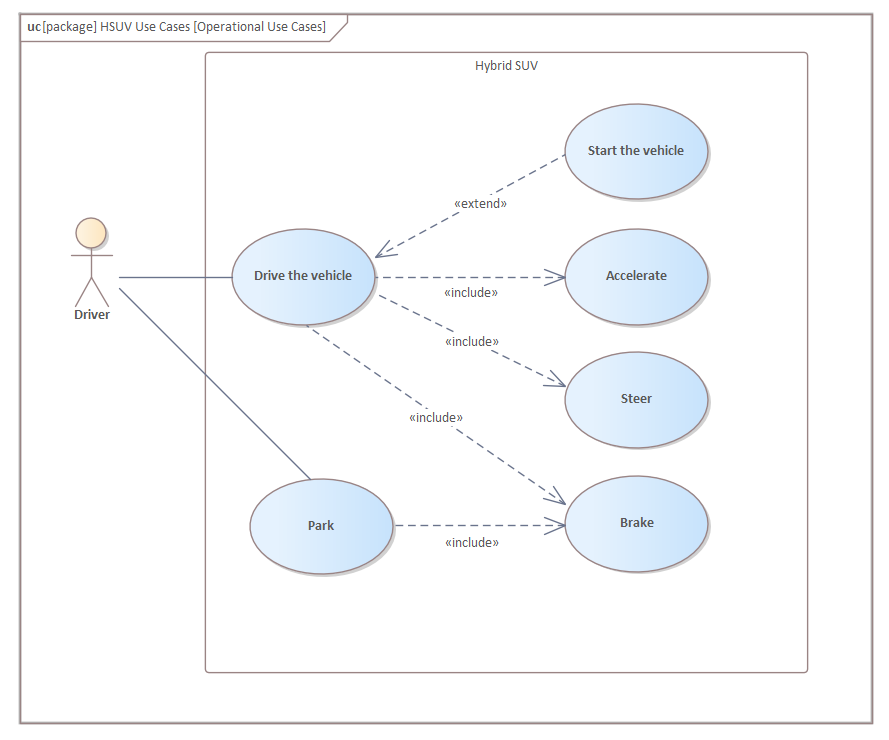


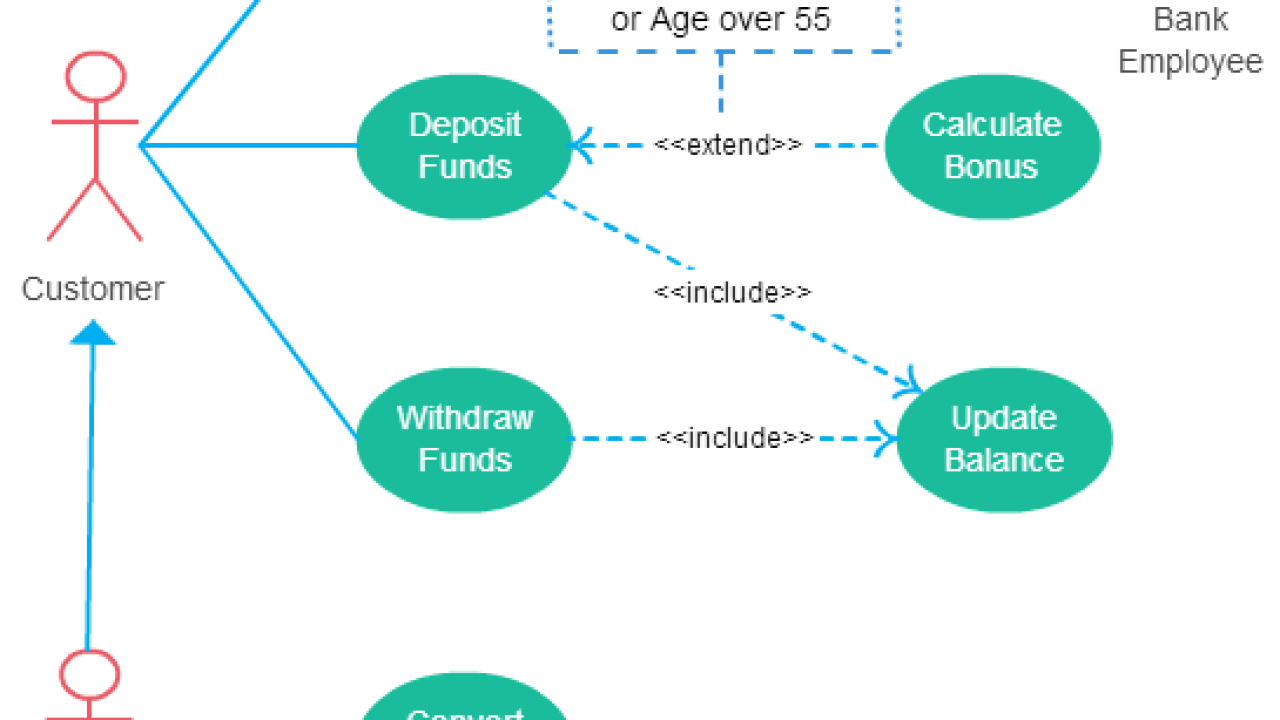



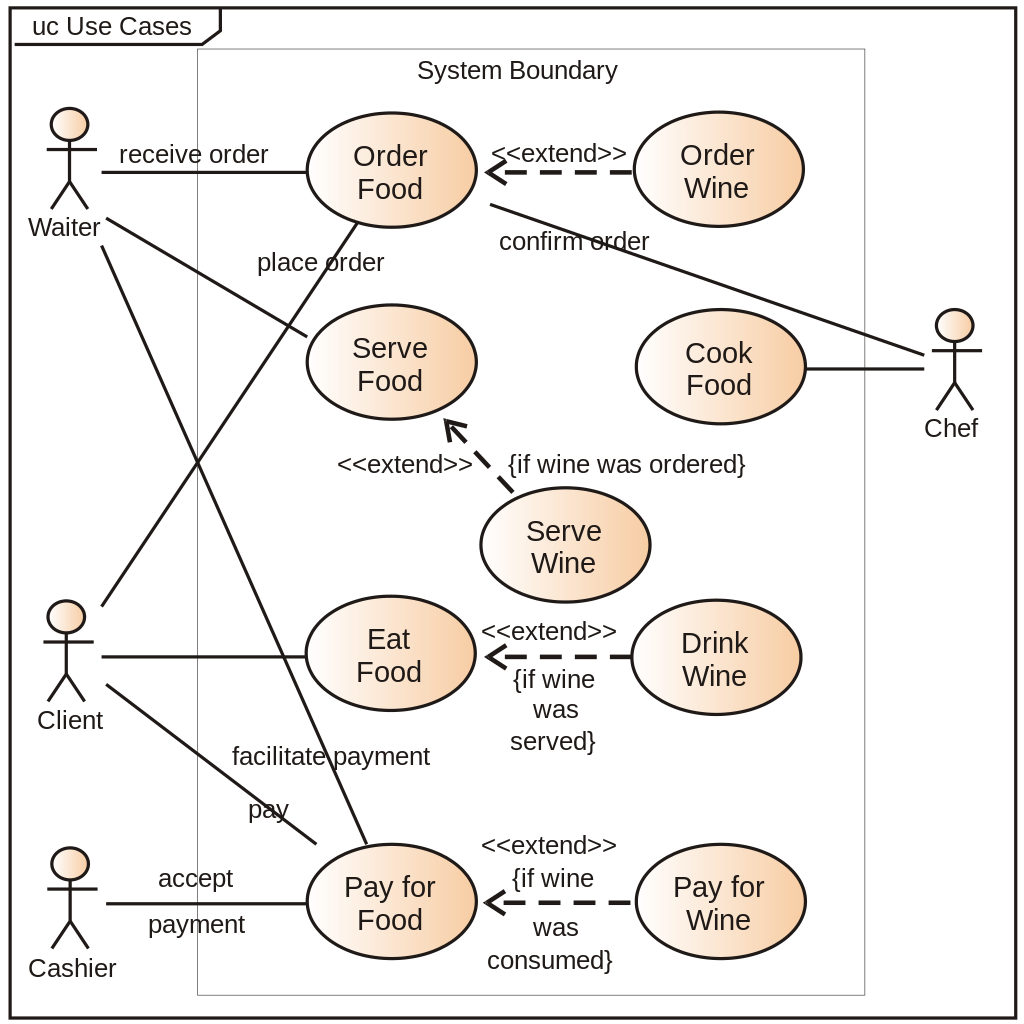

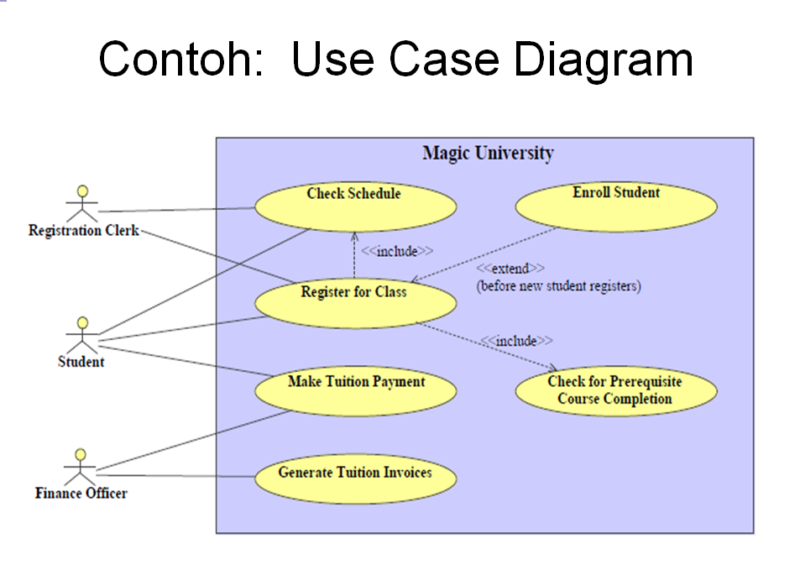





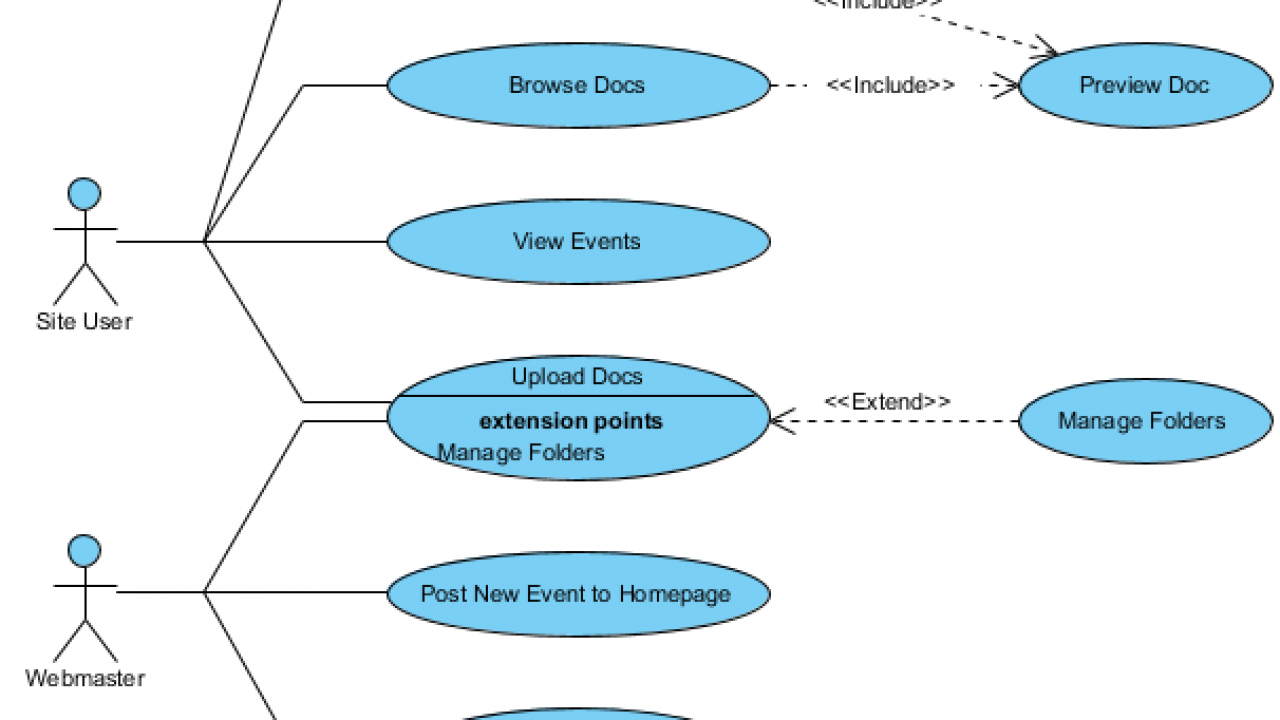

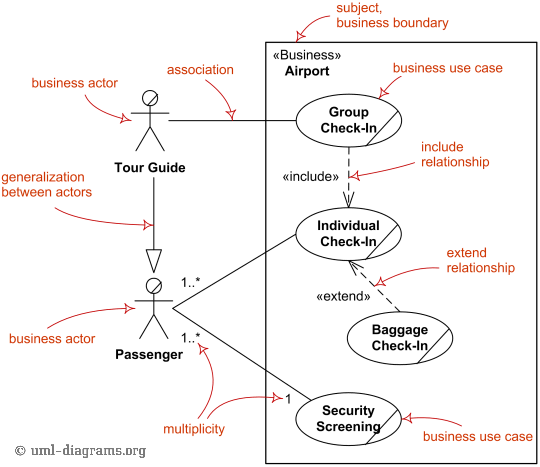


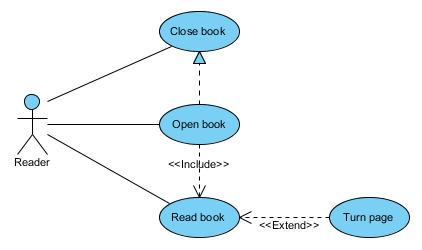

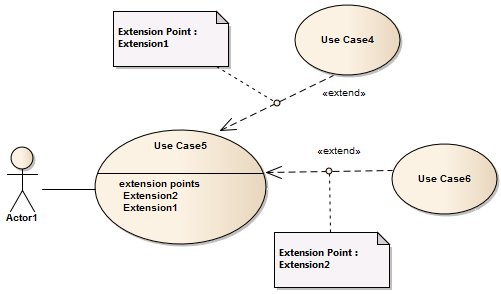

0 Response to "34 use case diagram extend"
Post a Comment